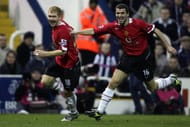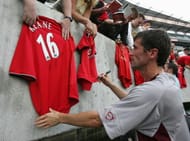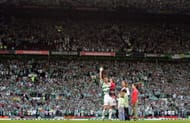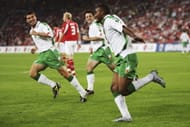MANCHESTER, ENGLAND – JANUARY 22: Roy Keane of Manchester United in action during the Barclays Premiership match between Manchester United and Aston Villa at Old Trafford on January 22, 2005 in Manchester, England.
Leadership has been described as “a process of social influence in which one person can enlist the aid and support the others in the accomplishment of a common task”. Leaders are required to develop future visions and to motivate the organizational members to want to achieve those visions. A leader takes the front line when there is a danger, and shies away from the spotlight when there is a celebration. A leader leads from the front, rallying his troops, and in the process, inspires them, motivates them, defends them and occasionally if required, admonish them.
If there is one man in football who epitomize and personifies the above said theory of leadership, it is the former Manchester United captain Roy Maurice Keane.
Roy Keane won seven Premier League titles with Manchester United and was the captain for six of them. Dynamic, driven, both feared and fearless, Roy Keane was born to be a leader. Sir Alex Ferguson labelled him the best he has ever worked with. He inspired, enthralled and occasionally appalled, helping United to become the most successful club in English football. Roy Keane symbolized the unwavering spirit and hunger for success, that Manchester United stands for.
Roy Keane signed for Manchester United from Nottingham Forest on 19 July 1993 for £3.75 million, a British transfer record at the time. To spend that kind of money, on a boy who’d barely been off the boat from Ireland and whose team had been relegated that season, tells you that they had seen something really special in him.
Keane became an instant hit at Old Trafford. Two goals on his home début against Sheffield United was the perfect way to embark on a glittering career, and he earned the instant acclaim of the United supporters. He just seemed to find his groove, earned the respect of his fellow players and was up and running straight away.
He became a hero of Stretford End when he scored the winner in the Manchester Derby at Maine road. United were 2-0 down against City and needed something special to get back into the game. Special it was, when Keane scored the winner after Eric Cantona’s two goals had put them on level terms.
That all the final confirmation needed for Manchester United to see they had a new favourite star.

WEST BROMWICH, ENGLAND – NOVEMBER 27: Paul Scholes of Manchester United celebrates his first goal with team mate Roy Keane, during the Barclays Premiership match between West Bromwich Albion and Manchester United at the Hawthorns Stadium, on November 27, 2004 in West Bromwich, England.
It was coming at a time when captain Bryan Robson was in the final stages of his career, where a series of injuries had already kept him out of the majority of the 92-93 season and continued into the 93-94 season. Roy Keane took full advantage of his run in the team, and by the end of the season, he had won his first trophy as United retained the Premier League title. Keane won his second trophy when United beat Chelsea in the FA Cup Final at Wembley and secured the club’s first ever Double.
But, if ever there was someone who could come close and fill Robson’s shoes, it was Roy Keane.
In the 97-98 season, Roy Keane took over as club Captain after the unexpected departure of Eric Cantona, although he missed the majority of the season due to a cruciate knee ligament injury sustained while tackling Leeds United Player Alf-Inge Haaland. United lost the title that season to Arsenal and many pundits considered Keane’s absence as the main reason behind it.
1998-99 saw the best of Manchester United and Roy Keane, when he inspirationally led his team to an unprecedented treble of Premier League, FA Cup and the UEFA Champions League.
Keane’s way was to lead by example. If there was an effort to be made, if there was a run to be pursued, if there was a ball that need to be hunted down or if there was a position that needed covering, it was Roy Keane who did it.
He portrayed all this during his inspirational display against Juventus in the Champions League Semi final second leg in Turin, where he helped his side come back from two goals down to win 3-2 against the likes of Zinedine Zidane and Edgar Davids. He had to play football on the edge, and that’s the way he played it. Although he was yellow carded early, thereby missing the final, it didn’t matter to him. All he was focused on was winning that game for United and help them reach the finals. He showed unbelievable single mindedness, put the team first, scored the goal, got them going and got them into the finals. Even the Italians stood and applauded him as he went off the pitch.
They saw a warrior, a gladiator, someone who gave everything that day for the team.
“It was the most emphatic display of selflessness I have seen on a football field. Pounding over every blade of grass, competing if he would rather die of exhaustion than lose, he inspired all around him. I felt it was an honour to be associated with such a player.”
-Sir Alex Ferguson on Keane’s performance against Juventus
He earned the right to tell his fellow players that this was how things were done. If we look at that era in Manchester United games, the number of late goals that they scored showed Roy Keane would never allowing that side to rest. This has now become a tradition at Manchester United.

PHILADELPHIA – JULY 27: Roy Keane of Manchester United signs Autographs for fans after a training session at Lincoln Finacial Field on July 27, 2004 in Philadelphia, Pennsylvania.
The following season, Keane led his team to their sixth Premier League title in eight years, and in the process, won the PFA Players’ Player of the Year and Football Writers’ Association Footballer of the Year.
Roy Keane always demanded highest of standards from himself as well as his players, and if there is someone that needed to be reminded, he was never shy of speaking his heart out on his face or in the public.
“Just because you are paid £120,000-a-week and play well for 20 minutes against Tottenham, you think you are a superstar.”
-Roy Keane said famously for teammate Rio Ferdinand after he felt that Ferdinand was not doing enough for the team.
Let alone the players, Roy Keane demanded highest of standards from his supporters as well. He criticized a section of United home fans for the lack of vocal support when Dynamo Kiev were dominating a match at Old Trafford in 2000 stating -
“Away from home our fans are fantastic, I’d call them the hardcore fans. But at home they have a few drinks and probably the prawn sandwiches, and they don’t realize what’s going on out on the pitch. I don’t think some of the people who come to Old Trafford can spell ‘football’, never mind understand it.”
That started a debate in England about the changing atmosphere brought about by the ‘Prawn Sandwich Brigade’ in football grounds.
His ruthlessness in maintaining the standards of the highest order, helped United to win three successive Premier League titles from 1999 to 2001, the last with a staggering gap of 16 points at the top.
And he was equally ever present for his players when they needed him by their side. He displayed it at Highbury, when Patrick Vieira sparked a war of words with Gary Neville inside the tunnel before the game and Roy Keane intervened and asked Vieira to rather face him instead. It was one of the iconic moments of the Premier League, where it looked as if they needed 15 rounds to sort it out between them rather than 90 minutes.
This was why players took notice of him as their leader and hence always stood by his words. There were flashes of anger, but he mostly exuded grim determination. He received eleven red cards while playing for Manchester United, but was always an integral part of the side.

MANCHESTER, UNITED KINGDOM – MAY 09: Roy Keane and his Children soak up the applause from a sell out crowd during the Roy Keane Testimonial match between Manchester United and Celtic at Old Trafford on May 9, 2006 in Manchester, England.
Roy Keane left United in November 2005, having parted ways via mutual consent. Few sportsmen led from the front in the way Keane did, on and off the pitch: More than 70,000 United and Celtic fans paid their tributes to him at his testimonial before he retired in June 2006.
But his career with the Republic of Ireland was marred by controversy. Despite Ireland beating Italy at USA 1994 and going through to the knockout stages, Keane criticised his side for the way they had played. After failing to qualify for the World Cup in 1998 and the Euros in 2000, Keane’s most infamous moment in the Irish four-leaf clover came in Saipan at the 2002 FIFA World Cup in Korea-Japan.
He criticised the training facilities the Irish had been provided, and was sent home after publicly blasting manager Mick McCarthy, saying:
“Mick, you’re a liar…you’re a f**king w**ker. I didn’t rate you as a player, I don’t rate you as a manager, and I don’t rate you as a person. You’re a f**king w***er and you can stick your World Cup up your a**e. The only reason I have any dealings with you is that somehow you are the manager of my country! You can stick it up your b****cks.”

BASEL, SWITZERLAND – SEPTEMBER 8: Clinton Morrison and Roy Keane celebrate a goal during the FIFA World Cup 2006 Group Four qualifying match between Switzerland and Republic of Ireland at The St. Jakob Stadium on September 8, 2004 in Basel, Switzerland.
Keane was sent home during the World Cup and was never recalled under McCarthy. He however returned under successor Brian Kerr and retired after Ireland failed to qualify for the 2006 FIFA World Cup.
Keane is the most successful captain in United’s history. His character, desire, determination, will to win and his inspirational performances on the pitch made him the best. A born winner and a leader, he mirrored Sir Alex Ferguson. It was Roy Keane who was the heart and soul of that team.
He just wanted to win and nothing else mattered.
Catch the rest of this series here: The 10 most influential captains of the modern era
